
News |
- First-Ever Excellence in Water Stewardship Awards
- Obama's New Climate Plan
- New Hydro Transmission Line To U.S.
- Manitoba Peat Mining Moratorium Extended
- Climate Talks in Warsaw Must Be About Commitment
- Toxic Spill In Alberta Biggest In History
- Fracking Wastewater Report Removes Deception
- Bipole III Report Due, Public Soon
- Flood Channel to Be Permanent
- Methane Could Speed Climate Change
- UN Calls For Action On Rising Carbon
- Toronto Exceeds Kyoto Target
| First-Ever Excellence in Water Stewardship Awards | 28 June 13 |
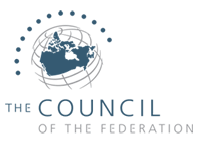
Stemming from the Water Charter, adopted by Premiers in August 2010, Premiers established this new award in recognition that water is critical to human and ecosystem health. A sustainable water supply ensures our communities are liveable and economically viable whether they are large urban centres or remote or rural communities. "On behalf of all Premiers, I want to congratulate the first-ever recipients of the Council of the Federation Excellence in Water Stewardship Award," said Nova Scotia Premier Darrell Dexter, Chair of the Council of the Federation. "These awards are an important mechanism for change as they bring deserved recognition to the champions of water stewardship and inspire all Canadians to take action." Manitoba's Lake Winnipeg Foundation is a recipient this year. View March 22, 2013 The Council of the Federation announcementView Lake Winnipeg Foundation website View The Council of the Federation Water Stewardship Council page View The AWS International Water Stewardship Standard View World Wildlife Foundation Developing an International Water Stewardship Standard page View British Columbia Government Water Act Modernization page |
|
 Print version Print version |
Top |
| Obama's New Climate Plan | 28 June 13 |

The speech was peppered with notable nods to the movement-building work undertaken by the environmental community, with a clear acknowledgment of Bill McKibben and 350.org. Bill McKibben responded to Obama's speech by saying "The world desperately needs climate leadership, and today Barack Obama showed he might turn out to be the guy who provided it." Limiting emissions from coal plants appears to first up. Watch June 25, 2013 President Obama speechView The President's Climate Action Plan View June 25, 2013 TckTckTck article View June 25, 2013 Pembina Institute media release View June 25, 2013 Greenpeace article View June 25, 2013 Common Dreams article View June 25, 2013 De Smog Blog article |
|
 Print version Print version |
Top |
| New Hydro Transmission Line To U.S. | 28 June 13 |

"Over the next few months, we will introduce the 500 kilovolt (kV) alternating current (AC) international transmission line project to the public and gather input to develop a full public engagement process that will begin in early fall of 2013. This public engagement process will provide numerous opportunities for the public to learn more about the project and share their interests and concerns with Manitoba Hydro," said Shannon Johnson, Manager of Licensing and Environmental Assessment at Manitoba Hydro. "The first steps in the process include informing Manitoba Hydro customers and landowners of the project and initiating contact with municipal and Aboriginal leaders and interest groups." The new transmission line is to carry energy to U.S. customers. View June 28, 2013 Manitoba Hydro news releaseView June 5, 2013 Winnipeg Sun article View April 21, 2012 Winnipeg Free Press article View March 9, 2012 Alberta Oil Magazine article |
|
 Print version Print version |
Top |
| Manitoba Peat Mining Moratorium Extended | 21 June 13 |
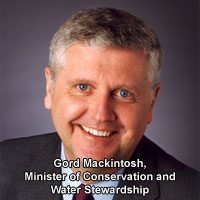
A new regulation under Manitoba's Mines Act was signed and registered June 3, 2013. The regulation blocks any new peat leases being issued, and blocks extension of existing peat mine operations from being put forward for licensing under the Environment Act. See link to regulation below. On February 25, 2013 the Manitoba Conservation and Water Stewardship department issued a press release about peat mining and the freezing of peat leases. The announcement (no further verification is available beyond the press release ) indicated that no peat mining would occur in Manitoba's parks. It also suspended "any new Environment Act applications or approvals for peat mining operations in Manitoba until the stewardship strategy is implemented." The current proposal under the Environment Act for an expanded peat mining operation licence to Sunterra was allowed to continue, and continues in the review and licensing process. Hundreds of Manitobans have objected to this proposal under the Act. It is also situated in Washow Peninsula. Minister Mackintosh also directed that Manitoba buy out SunGro's leases and application for a peat mine environment licence in Grindstone, a peninsula within Helca provincial park. Two First Nations, Peguis and Fisher River First Nations, are currently undertaking community reviews of the Sunterra proposal. Both communities waited eight months for approved funding to undertake their community processes. View Mines Act - Extension of Peat Moratorium RegulationView February 25, 2013 Manitoba Government February 25, 2013 News Release View more information on Manitoba Wildlands Peat Mining in Manitoba page |
|
 Print version Print version |
Top |
| Climate Talks in Warsaw Must Be About Commitment | 21 June 13 |
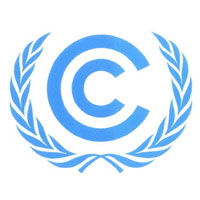
The call came as the latest round of talks closed in Bonn today, June 14th, with incremental progress on the shape of a comprehensive climate deal to be agreed in 2015. Greenpeace UK political advisor Ruth Davis said a deadline for pledges was vital for the negotiations to remain on track. "This deadline is needed partly to give enough time to assess the pledges against the latest climate science, and partly so that countries can compare their efforts," Davis said. "Having enough time to negotiate these targets is vital to avoiding the kind of last minute scramble that made the 2009 Copenhagen summit such a disaster." These negotiations were held against a backdrop of the worst recorded flooding in Eastern Europe and extreme weather in the US. German and New York officials stated this week that they would spend billions fortifying their cities against future extreme weather, showing that the costs of climate change are already being tallied in rich countries as well as poor. View June 14, 2013 Climate Action Network International articleView Climate Action Network Bonn Climate Change Conference event page View Climate Action Sustainable Innovation Forum website View United Nations Framework Convention on Climate Change website View The University Centre for Development Cooperation website |
|
 Print version Print version |
Top |
| Toxic Spill In Alberta Biggest In History | 21 June 13 |
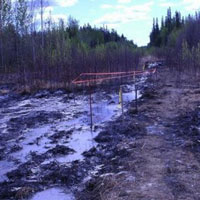
Source: Care2.com
The spill was first discovered June 1st, near Zama City, roughly 100 kilometres south of the Northwest Territories border. Texas-based Apache Corporation, the oil company responsible for the spill, released their estimate of its size on June 12th. "Every plant and tree died" in the area touched by the spill, said James Ahnassay, Chief of the Dene Tha First Nation, whose members run traplines in an area that has seen oil and gas development since the 1950s. Produced-water leaks are considered easier to clean up than oil spills. But the Dene Tha suspect this is a long-standing spill that may have gone undetected for months, given the widespread damage it has done. Apache and the Alberta government say its duration is under investigation. View June 20, 2013 Care2 articleView June 13, 2013 Yahoo! Canada News article View June 12, 2013 The Globe and Mail article View June 9, 2013 Yahoo! Canada News article View May 2, 2013 The Globe and Mail article |
|
 Print version Print version |
Top |
| Fracking Wastewater Report Removes Deception | 21 June 13 |
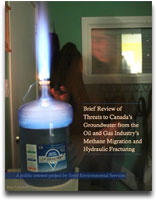
As a consultant for the oil and gas industry for thirty years, Ernst became concerned about its impacts when they began to hit home "I am living with dangerous contamination after EnCana hydraulically fractured my community's drinking water aquifers." "Jessica Ernst has made a strong case," says Will Koop, BC Tapwater Alliance Coordinator. "Her collection provides excellent and technically friendly working tools, enabling the public to draw their own conclusions from the critical information. This is not just an invaluable document for North Americans, but for the world." Ernst's 93-page report, Brief Review of Threats to Groundwater from the Oil and Gas Industry's Methane Migration and Hydraulic Fracturing, will be a game-changing document, providing little wiggle room for private industry and government spokespeople advocating fracking be immune from public concern, criticism and liability. View June 20, 2013 The Common Sense Canadian articleView Ernst v. EnCana Corporation website View June 18, 2013 EcoWatch article View View Enrst Environmental Services report |
|
 Print version Print version |
Top |
| Bipole III Report Due, Public Soon | 14 June 13 |

Bipole III is a 1400 km direct current 500 kv transmission system from the northern portion of the Nelson River where new generation stations are planned, that travels across the north, down the west side of the province, and then through southern Manitoba to Winnipeg. New green energy from new generation stations is expected to travel on the new system. Transcripts, exhibits, and various filings and presentations from the hearings are on line at the CEC website. Manitoba Wildlands has also maintained a record of all documents, events, motions, and decisions in the Bipole III process, and has been active in public reviews of the project since 2010. View Clean Environment Commission Bipole III earingsView Manitoba Wildlands Bipole III CEC Hearings page View Bipole III documents, events, decisions Chart |
|
 Print version Print version |
Top |
| Flood Channel to Be Permanent | 14 June 13 |
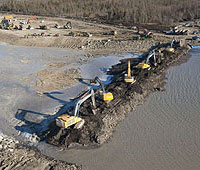
Engineers are designing plans for boosting Lake Manitoba outlet capacity. The increase to the Manitoba provincial sales tax will pay for $250 million in flood infrastructure. Over 800 homes, businesses and farms around Lake Manitoba were flooded in 2011. Several First Nations were flooded, with mass evacuations involved. Damages to property, and evacuations from 2011 are ongoing in 2013. View May 29, 2013 CBC News articleView May 29, 2013 ChrisD.ca article View May 29, 2013 CTV News article View May 29, 2013 Manitoba Government article View March 13, 2013 Winnipeg Free Press article View February 2013 Manitoba Government report View more on Manitoba Wildlands Manitoba Floods page |
|
 Print version Print version |
Top |
| Methane Could Speed Climate Change | 14 June 13 |

Carbon dioxide emissions fell last year to their lowest point since 1994, according to the Department of Energy. Energy-related carbon dioxide emissions were 12% below 2005 levels. Methane is released when natural gas deposits are drilled open, excess gas is burned off at a well site, and when permafrost melts and arctic oceans warm up releasing trapped methane crystals from the cold layers of water under arctic sea ice. View June 4, 2013 The Guardian articleView June 2013 Center for Climate and Energy Solutions report View May 15, 2013 Science Daily article View 2011 Nature Education report |
|
 Print version Print version |
Top |
| UN Calls For Action On Rising Carbon | 14 June 13 |

"I do not need to remind you that we simply cannot afford not to deliver implementation results urgently," Chief of the UN Framework Convention on Climate Change (UNFCCC) Christiana Figueres told delegates. Greenpeace chief Kumi Naidoo warned not to put too much faith in the UN on climate, adding that he had "no reason to have even any sense of optimism" that anything has changed since the last UNFCCC meeting failed in Doha, Qatar last December. "The UN negotiating system is cumbersome, it is problematic, it is tedious. However, the UN, warts and all, is the best and only vehicle we have to ensure we can move forward as a united global family to address climate change." View June 8, 2013 The Japan Times articleView June 6, 2013 Discovery article View June 3, 2013 Common Dreams article View June 3, 2013 France 24 article View May 10, 2013 The New York Times article View May 10, 2013 Common Dreams article View May 10, 2013 Greenpeace article |
|
 Print version Print version |
Top |
| Toronto Exceeds Kyoto Target | 14 June 13 |

"Toronto's success demonstrates it is possible for a growing, thriving city to reduce climate change pollution. De-coupling growth and carbon is a trajectory we need to keep moving along" says Toronto Atmospheric Fund (TAF) CEO Julia Langer. Since 1990, Toronto's economy has grown by about 70%, population has grown by 15% yet GHG emissions have fallen. TAF has been sparking action on climate, air pollution and energy use in Toronto for 20 years. Internationally recognized for its innovative and effective programs, TAF has helped Toronto save more than $55 million on energy costs and helped citizens live greener lives in healthier communities. View April 24, 2013 Eight by Fifty articleView September 21, 2002 report Ratification of the Kyoto Protocol View April 2012 Toronto Public Health report View September 16, 2012 Smart Planet article View U.S. Conference of Mayors Climate Protection Agreement |
|
 Print version Print version |
Top |


 RSS Feeds:
RSS Feeds: